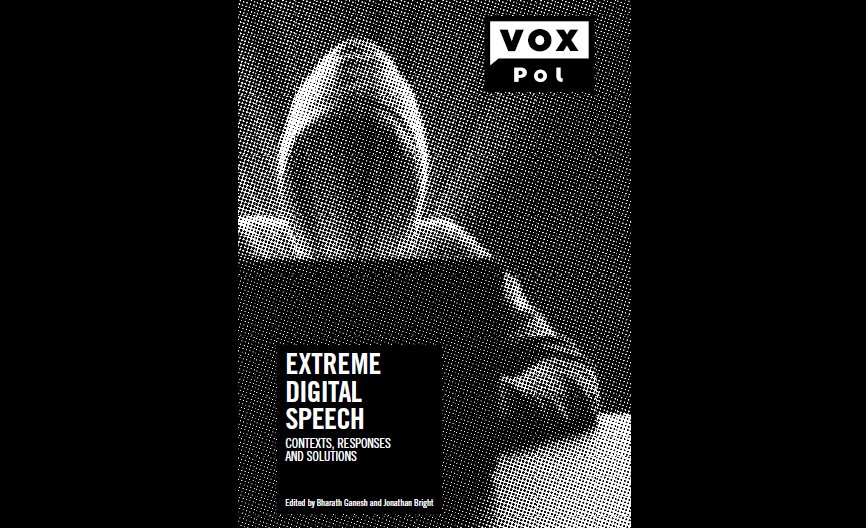VOX-Pol is pleased to present the latest report in the VOX-Pol publication series, titled Extreme Digital Speech: Contexts, Responses and Solutions, edited by Bharath Ganesh and Jonathan Bright.
About the Report
Extreme digital speech (EDS) is an emerging challenge that requires co-ordination between governments, civil society and the private sector. In this report, a range of experts on countering extremism consider the challenges that EDS presents to these stakeholders, the impact that EDS has and the responses taken by these actors to counter it. By focusing on EDS, consideration of the topic is limited to the forms of extreme speech that take place online, often on social media platforms and multimedia messaging applications such as WhatsApp and Telegram. Furthermore, by focusing on EDS rather than explicitly violent forms of extreme speech online, the report departs from a focus on violence and incorporates a broader range of issues such as hateful and dehumanising speech and the complex cultures and politics that have formed around EDS.
This focus brings into view a much broader range of factors that help assemble extremist networks online. This perspective is necessary, given the role that hate speech plays in extreme right-wing networks and the complexity of Daesh propaganda which uses videos to synthesise utopic images of life in the so-called ‘Khilafa’. Following JM Berger’s recent book, Extremism (2018), we can think of EDS as a core practice that produces an archive of online extremist resources that reinforce the sense of in-group belonging across a network of geographically dispersed users, whether this be the networks of jihadists connected on Telegram, or right-wing extremists that use trolling tactics to hack mainstream opinion on Twitter.
The concept of global extreme speech is developed under Project ONLINERPOL funded by the European Research Council and hosted at LMU Munich, where contributing author Matti Pohjonen is a cooperation partner.
About the Editors
Bharath Ganesh is an Assistant Professor in the Centre for Media and Journalism Studies at the University of Groningen and a Visiting Research Associate at the Oxford Internet Institute. His research focuses on hate, intolerance and prejudice in Europe and North America, racism and bigotry in digital propaganda, and regulatory responses to online extremism. Bharath was a postdoctoral researcher at the Oxford Internet Institute, where he contributed to projects on computational propaganda, the VOX-Pol Network of Excellence, and projects on data science use in local government. He holds a PhD in Geography from University College London. His recent publications have appeared in Journal of International Affairs, Foreign Policy and European Societies.
Jonathan Bright is a Senior Research Fellow at the Oxford Internet Institute who specialises in computational approaches to understanding online political behaviour and communication. His research interests include the study of digital campaign communication, echo chambers, online radical behaviour and online harms. His recent work has been published in leading journals in the field such as Journal of Communication, Communication Research and Journal of Computer-Mediated Communication. He is also an editor of the journal Policy & Internet.
Accessing VOX-Pol Reports
All VOX-Pol reports are open-access. This report is available for download HERE.
